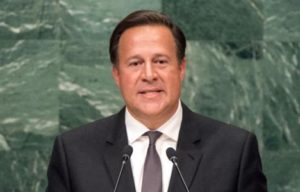
President Juan Carlos Varela Rodríguez of Panama addressing the general debate of the UN General Assembly’s 71st session on Thursday. UN Photo/Cia Pak
PANAMA CITY, Panama — On Friday, the president of Panama, Juan Carlos Varela, expressed confidence that the flow of Haitian migrants in Central America will decline following the decision of the United States to reactivate the deportation of undocumented Haitians.
Varela noted that the U.S. government had decided to eliminate immigration benefits granted to Haitians after the earthquake of 2010, which allows the resumption deportation of those who enter its territory illegally, HaitiLibre reported.
“This, in one way or another, will discourage the flow of Haitians,” stressed Varela after a meeting of police chiefs of America in Panama.
Thousands of Haitians have been trying to reach the United States through Central America over the past months. Most of them emigrated to Brazil after the earthquake, but the economic decline of the South American giant, has led them to look for opportunities in the United States.
According to the Panamanian authorities, each year more than 30,000 immigrants from Haiti, Cuba and the countries of Asia and Africa, pass through Central America and Mexico to the United States.
Haitians have seen their path blocked by Nicaragua’s refusal to allow them to pass, which left thousands waiting in Costa Rica, Panama and Colombia.
Although the Panamanian government closed its border in the inhospitable jungle of Darien, migrants continued despite the risks to which they are subject: violence, theft and extortion by traffickers and other criminal groups.
The Panamanian government has set up three camps for some 3,000 migrants on the border with Colombia.
Varela warned Haitians that it is “a risky transit” through Central America and Mexico, which “could lead them nowhere, because the new U.S. decision could lead to their deportation to Haiti.”
Read more here.


